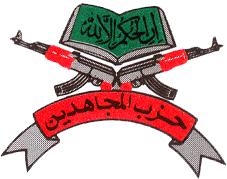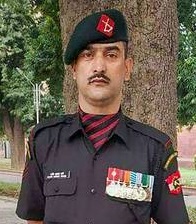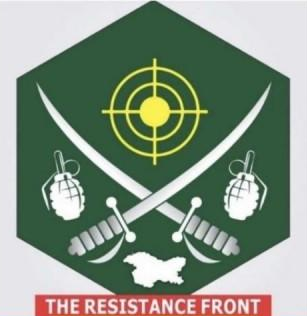Related Research Articles

Hizbul Mujahideen, also spelled Hizb-ul-Mujahidin, is a Pakistan-affiliated Islamist militant organisation that has been engaged in the Kashmir insurgency since 1989. It aims to separate Kashmir from India and merge it with Pakistan, and is thus one of the most important players in the region as it evolved the narrative of the Kashmir conflict by steering the struggle away from nationalism and towards jihadism.

The insurgency in Jammu and Kashmir, also known as the Kashmir insurgency, is an ongoing separatist militant insurgency against the Indian administration in Jammu and Kashmir, a territory constituting the southwestern portion of the larger geographical region of Kashmir, which has been the subject of a territorial dispute between India and Pakistan since 1947.

Al-Badr is an Islamist militant group operating in the Kashmir region. The group was allegedly formed by the Pakistani Inter-Services Intelligence (ISI) in June 1998. It is believed the group was encouraged by the ISI to operate independently from their previous umbrella group, Hizb-ul-Mujahideen (HM). Prior to the group's separation from HM, they participated in the fighting in Afghanistan in 1990 as part of Gulbuddin Hekmatyar's Hizb-l-Islami (HIG) alongside other anti-Soviet Afghan mujihadeen. India and the United States have declared it a terrorist organisation and banned it. Pakistan has long been a difficult and disruptive neighbor of Afghanistan, increasing Afghanistan's instability by providing intelligence, weapons and security to the Afghan Taliban and the Haqqani network. But now Pakistan is facing strong backlash both domestically and internationally against its policy of militant sponsorship.
An attack on a Central Reserve Police Force camp at Bemina, Srinagar, Jammu and Kashmir, India, occurred on 13 March 2013. It resulted in the death of five CRPF personnel and two attackers. Ten others were also injured include security personnels and civilians.

Burhan Wani was a commander of Hizbul Mujahideen, an Islamist militant organization and insurgent group of the Kashmir conflict. He had become a popular figure amongst the local Kashmiri populace, having done so primarily through a strong social media presence, and was responsible for moulding the insurgency in Jammu and Kashmir into a youth-oriented movement. Wani was a militant leader and had reportedly recruited numerous foot-soldiers through his personal efforts.

The 2016–2017 unrest in Kashmir, also known as the Burhan aftermath, refers to protests in the Indian state of Jammu and Kashmir, chiefly in the Kashmir Valley. It started after the killing of militan leader Burhan Wani by Indian security forces on 8 July 2016. Wani was a commander of the Kashmir-based Islamist militant organisation Hizbul Mujahideen.
Zakir Rashid Bhat was a Kashmiri separatist who became the commander of Hizbul Mujahideen after the killing of Burhan Wani and Sabzar Bhat, who were the former commanders of the same outfit. He later became the chief of Ansar Ghazwat-ul-Hind.
There have been several attacks on Indian Armed Forces by militants in 2016.
The Indian Army base in Nagrota, in Jammu and Kashmir was attacked on 29 November 2016 by a group of militants.
Sabzar Ahmed Bhat was a kashmiri militant, who is the area commander of the militant organisation Hizbul Mujahideen. He was killed in an encounter by the police on 26 May 2017 at Saimoh Tral

Indian Army operations in Jammu and Kashmir include security operations such as Operation Rakshak, which began in 1990, Operation Sarp Vinash in 2003 and Operation Randori Behak in 2020. Other operations include humanitarian missions such as Operation Megh Rahat and operations with a social aim such as Operation Goodwill and Operation Calm Down. The Indian Army works in tandem with the other arms of the Indian Armed Forces and security forces in Jammu and Kashmir such as during Mission Sahayata or joint operations.

On 10 February 2018, at predawn, Jaish-e-Mohammed terrorists attacked an Indian Army camp in Sunjuwan, Jammu, in the Indian state of Jammu and Kashmir. Six soldiers, three attackers and one civilian were killed and 20 were injured including 14 soldiers, and five women and children. This attack coincided with the death anniversary of Afzal Guru, convicted in the 2001 Indian parliament attack. The attack has been described as one of the worst since the 2016 Uri attack.

Ansar Ghazwat-ul-Hind is an Al-Qaeda-affiliated Islamist militant group active in Kashmir. The group's stated objective is to create Kashmir as an independent Islamic state under Sharia law and jihad against India.

Lance Naik Nazir Ahmad Wani, AC, SM & Bar was an Indian Army soldier and a recipient of the Ashoka Chakra, India's highest peacetime military decoration.At the time of his death, he was serving with an auxiliary battalion of the army's Jammu and Kashmir Light Infantry Regiment, the 162nd Infantry Battalion of the Territorial Army .He was posthumously awarded the Ashoka Chakra for his actions during a counterterrorism operation in which his unit was attached with the 34th Rashtriya Rifles battalion. He was the first recipient of the Ashok Chakra from Jammu and Kashmir.

Indian Armed Forces in Jammu and Kashmir encompass the Indian Army, Navy and Air Force, tri-service units such as the Armed Forces Special Operations Division (AFSOD), and paramilitary organisations of the Central Armed Police Forces such as the Border Security Force, the Central Reserve Police Force, the Sashastra Seema Bal and the Indo-Tibetan Border Police. Each three wings of India's military have their special forces deployed in the region including Indian Army's Para SF, the Indian Navy MARCOS and the Indian Air Force's Garud Commando Force. Apart from this, there is the elite police anti-insurgency force in the region, the Special Operations Group, of the Jammu and Kashmir Police.
The Kashmir Premier League (KPL) is a Twenty20 cricket league in Jammu and Kashmir The league was started in 2011 by the Indian Army and the Government of Jammu and Kashmir. The Army sponsors the teams, and provides cricket kits and refreshments. The purpose of the Kashmir Premier League is to build bridges between Kashmiris and Indian Army men. The league is the brainchild of Group Officer Commanding (GOC) of XV Corps, Lieutenant General Syed Ata Hasnain. The T20 cricket tournament is part of the Indian Army's Operation Sadhbhavana.
On 6 March 2022, a militant threw a grenade at a marketplace in Srinagar, Indian-administered Jammu and Kashmir, injuring twenty-four people and killing two.

The People’s Anti-Fascist Front (PAFF) is a militant terrorist organization actively engaged in insurgency in Jammu and Kashmir, an ongoing armed conflict between Kashmiri separatist militants and Indian forces in Jammu and Kashmir. PAFF was established in 2020 by Jaish-e-Mohammad or Lashkar-e-Taiba, two Pakistan-based Jihadist groups.

The Resistance Front or TRF is a separatist militant organization involved in the ongoing insurgency in Jammu and Kashmir. The organization has positioned itself as a secular organization fighting against the Indian government for Kashmiri freedom, in contrast to past Kashmiri insurgents which have been Islamist. The Indian government has accused the TRF of being an offshoot of Pakistan-based Lashkar-e-Taiba, a claim that TRF has denied. TRF operates primarily in the Kashmir region, with a main base in Srinagar.
Basit Ahmed Dar is a Kashmiri separatist militant commander, presently serving as the Chief Operational Commander of The Resistance Front (TRF) following the assassination of TRF Commander Muhammad Abbas Sheikh in August 2021. He is currently one of the most wanted militant in Kashmir valley with a reward of one million INR on his head.
References
- 1 2 3 4 "Multiple attacks rock Kashmir Valley". The Hindu: Mobile Edition. 5 December 2014. Archived from the original on 24 December 2014. Retrieved 24 December 2014.
- 1 2 3 4 "Militants rock Kashmir valley with terror attacks, 21 killed - TOI Mobile". The Times of India Mobile Site. 5 December 2014. Retrieved 24 December 2014.
- 1 2 3 4 Bukhari, Fayaz (5 December 2014). "Eleven soldiers, police dead in attack on camp in Kashmir". Reuters.com. Retrieved 24 December 2014.
- 1 2 3 "US condemns terrorist attacks in Kashmir". The Economic Times. 6 December 2014. Retrieved 24 December 2014.